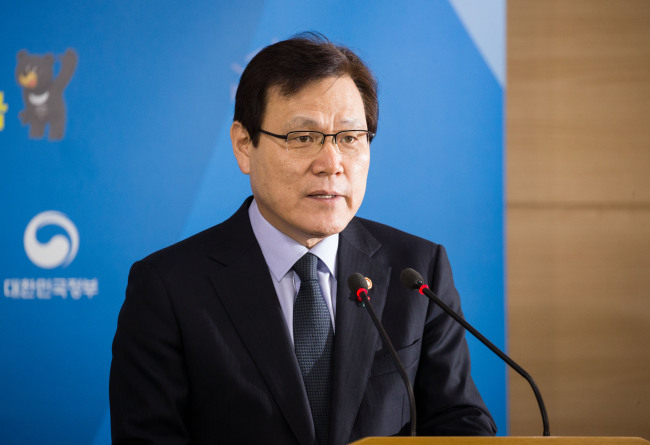Finance
[BLOCKCHAIN] Korea to examine bank regulations on cryptocurrency trading
[THE INVESTOR] Korea’s financial authorities on Jan. 8 launched an investigation into cryptocurrency-related services provided by local banks amid criticism that recent government measures are having little impact on cooling the markets.
The Korea Financial Intelligence Unit, a body under the Financial Services Commission that monitors illegal financial activities, and the Financial Supervisory Commission, the country’s financial watchdog, are looking into cryptocurrency-related virtual accounts at six local banks to check the banks’ compliance with anti-money laundering regulations dealing with mostly anonymous trading of digital currencies, according to the FSC.
“There are some concerns that banks are neglecting their role to stave off transactions of criminal and illegal funds,” Choi Jong-ku, chairman of FSC told reporters in an emergency press conference.
“We will check if the banks are complying with all necessary anti-money laundering regulations and if illegal activities are found, we will punish banks and make virtual accounts services for them extremely difficult.”
The government currently has no legal grounds to directly check exchanges, and is hoping tightened scrutiny over banks will help detect illegal activities.
 |
Financial Services Commission Chairman Choi Jong-ku |
Related:
Cryptocurrency transactions face strict surveillance
Seoul denies blanket ban on new cryptocurrency investments
As of mid-December, more than 2 trillion won (US$1.80 billion) was deposited in 111 virtual accounts provided by six banks -- KB Kookmin Bank, Woori Bank, NH NongHyup Bank, Shinhan Bank, Industrial Bank of Korea and Korea Development Bank -- according to Democratic Party Lawmaker Park Young-jin last week. Each account is presumed to have generated millions of virtual accounts.
The FIU and FSS are also reviewing the banks’ adaptation of the upcoming real-name account system, which is the core of the government’s recent measures announced on Dec. 28 amid growing fears that the latest price hikes are a bubble waiting to burst.
Starting from Jan. 20, banks that are prepared will launch the new real-name account system. Under it, only those with bank accounts registered under the same name of their cryptocurrency accounts can make deposits and withdrawals.
Choi said he disagreed with some criticism that the government is interrupting free market activities and the government measures are ineffective. “As speculative investments increase, I don’t think we can say the government is disrupting (normal market activity),” Choi said. “I know there is some criticism that the measures have little impact. This is because we haven’t built a system to regulate this new market frenzy yet.”
Choi also reiterated that the government is still considering a possible shutdown of exchanges, if necessary.
Despite such measures and announcements, the so-called “Kimchi Premium” remains.
The price of the most popular digital currency Bitcoin in Korea slid 1.47 percent from a day earlier to 24,790,000 won (US$23,302) as of 3:16 p.m., according to Bithumb, Korea’s largest digital currency exchange. The price of Bitcoin on US-based Coindesk was US$15,860.
This price discrepancy, according to Choi, is an indication that Korea’s cryptocurrency market is not abnormal. “I know we can’t prevent investors from going abroad, but we should at least prevent illegal domestic transactions from having a negative impact overseas.”
Some market watchers predict that the Korean government’s all-out efforts to curb cryptocurrency trading could actually raise the value of cryptocurrency.
“Governments can declare cryptocurrency illegal, but the measures may have the contrary effect of creating more demand by making them scarcer, thereby raising the overall value,” said Moon Hong-chul, analyst at DB Financial Investment.
He added that said the authorities may aim for an outright ban on cryptocurrency because they will never want to give up its right to control and issue new currencies.
“The government will likely ban possession and exchange of cryptocurrency altogether, but this won't dilute the value of ore than simply prohibiting the use of them in real life,” he said. “But the value of cryptocurrency won’t disappear by banning the possession or exchange.
For instance, if the cryptocurrency exchange becomes illegal in the Korean market, coin holders will change their cryptocurrencies into other foreign currencies and switch then back to Korean won, he explained. Even when all the countries decide to ban cryptocurrency, there will always be a black market driving the demand.
By Park Ga-young (gypark@heraldcorp.com)








